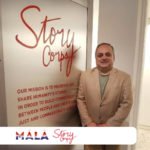Narimon Safavi: To Chicago, From Tehran
Narimon Safavi is a Chicago based Iranian-American entrepreneur who is also a contributor and analyst for the radio program Worldview on WBEZ (Chicago Public Media). This story was produced through a community partnership with MALA and StoryCorps.
“I was born in Tehran, Iran, 57 years ago, but my family had already resided in Chicago, Illinois. Early memories … I ended up coming from Tehran to Chicago directly, and was very very much impressed with the city and the way that the infrastructure was well built. The second day after I came over here I went and checked out the school, and I was amazed as to the level of facilities that were available here. Big, big open fields for playing football and soccer, and a basketball stadium. I mean things that even only, maybe, at the professional or the national team level/Olympic level had those kinds of facilities, and this is just a high school.
It was really amazing, I was shocked as to the level of abundance that there is in this country. Just by the lushness and the greenness and the highways and the freeways and how well-built they are. It’s amazingly shocking when you come from a third world situation, to see that level of development, and then just dive right into it.
I started to meet African American kids from the Southside of Chicago, I started to meet Latino kids from the Westside of Chicago, and I also started to meet farmers’ kids from downstate Illinois. That was really an eye-opening experience as to what the real America is all about. Image that I had what about America is, from Iran, started to erode gradually and I became much more realistic.
I always considered myself a progressive, and I was supporting a progressive Republican that really doesn’t exist anymore. But, at the same time, I was also helping start an organization called the Third World Student Association. We had organized something in the lobby of the International House of Illinois State University, which was at that time in Fell Hall, was a very sort of an ornate, beautiful, historical building with a gorgeous lobby and a fireplace and lots of sofas around. We had organized a Thursday night meeting called “Global Review,” where we would get together and assess global politics and maybe even invite some of the professors who were experts in different topics to come and give us talks about that. I was active in that way in the sense of trying to understand the people of the third world, and give the voice of the people of the third world in Central Illinois to these kids who are coming from all over the state of Illinois and Midwest and other parts of the United States.
After LA, I moved back to Chicago, after about seven years and helped with my brothers to start a jewelry company over here. A retailing business over here. Did that for a few years, I was thinking about launching a new line of jewelry that’s more a reinterpretation of the designs of the jewelry of the Persian monarchy.
Then, September 11 happened, and I just decided that launching a line of jewelry that has roots of its design from a Muslim country probably is not a good marketing idea at this point. That idea just kind of took a backseat and I moved into a different direction.
Actually, when September 11 happened I was in Venice, in Italy. I was travelling, I was doing one of my trips to Europe and I had already joined the board of a human rights organization that was meeting that summer in Italy a couple of weeks before that. I was also on the board of the Latino film festival of Chicago, and for that I had to travel a few weeks later to San Sebastian, Spain, to look at some films and represent that festival over there. So I was in between Italy and Spain, and I decided to go to Venice and just hang out for a few days. And then September 11 happened while I was in Venice.
Social media and technology are great, and those are fantastic skills to master, however they are not a substitute for real human relationships.
Make sure that you invest – your time, your effort, your money – into some real human relationships. Make sure those are relationships, they’re not transactions. When you have proper human relationships, that are really long term and there is depth to them, there is seriousness to them, then all of a sudden then you really have something to work on. Not only you will benefit from it, but your friends will benefit from it. Where, almost your personal benefits of that is not only enormous, but at the same time become irrelevant, because you realize that through those relationships, you become greater than the sum of your parts. You kind of lose that sense of self-interest, and a lot of what we call “success,” really comes to you almost effortlessly. So invest in real relationships.”


